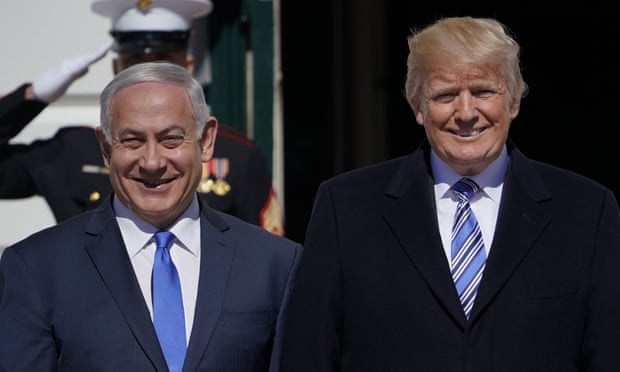
Donald Trump and Benjamin Netanyahu in 2018. Trump said the Golan Heights were of ‘critical strategic and security importance to the state of Israel and regional stability’. Photograph: Mandel Ngan/AFP/Getty Images
By Ke Yongxin
US President Donald Trump signed a decree saying that the US recognizes Israeli sovereignty over the Golan Heights, fanning the flames in the already complicated Middle East. The 140th Assembly of the Inter-Parliamentary Union (IPU) issued a presidential statement on April 10 that condemns the recent US recognition of the Golan Heights as part of Israel.
According to the statement, the IPU stands for the inadmissibility of the acquisition of other countries’ territory by war. The US recognition of the Golan Heights runs counter to UN Security Council resolution and moves the world further away from achieving a just and lasting peace in the Middle East.
Similar to the impact of withdrawing from the Iranian nuclear deal and recognizing Jerusalem as the capital of Israel, Trump’s latest statement has no practical effect on the legal level. UN Security Council resolution 497 passing in 1981 strongly discourages any attempt by Israel to “impose its laws, jurisdiction and administration in the occupied Syrian Golan Heights” and considers such attempts as “null and void and without international legal effect.” So, what is Trump’s intention behind moves to ditch the UN resolution in favor of Israel?
Attracting political allies to support the US policy in the Middle East is one of the US goals
Amid opposition from the rest of the world, especially Arab countries, recognizing Israel’s “sovereignty” over the Golan Heights means that the US has completely abandoned the political position that it remains apparently at least neutral in the Arab-Israeli conflict. For Israeli Prime Minister Benjamin Netanyahu it is undoubtedly a “big gift”.
Domestic national elections will take place in Israel in April. Its centrist candidates advocate a moderate foreign policy, which is contrary to the US strategy of requiring Israel to contain Iran. Therefore, Trump’s statement is timely help for Netanyahu, who is seeking right-wing support. It is also part of the US anti-Iran strategy.
Disrupting the situation in the Middle East and reaping profits from it is a typical US move
As the clout of “Islamic State” and other extreme organizations fades away, the Middle East is likely to usher in a relatively stable period. For the Middle East, the “big gift” created by the US to Israel at this time is more like an “explosive package” that will disrupt the situation in the region.
The Golan Heights is in an extremely important strategic position, and its water resources are abundant. It is already under the actual control of Israel. From a military perspective, the US does not have to make this statement. However, Israel has problems with surrounding Arab countries that are difficult to reconcile. The US previously announced that it recognized Jerusalem as the capital of Israel and officially moved its embassy to Jerusalem, and this time, the US recognized Israel’s “sovereignty” over the Golan Heights. The series of moves has intensified contradictions between Arab countries and Israel. Recognizing Israel’s “sovereignty” over the Golan Heights will help Israel gain a strategic advantage over the Arab world.
With containment by Israel, the US has also been able to obtain more bargaining chips with Arab countries in the oil markets. Saudi Arabia is a major member of OPEC and has partial pricing power over the oil trade. As a result of Saudi Aramco’s delayed IPO last year, Saudi Arabia gradually drifted away rather than moving closer to the US. The US cannot continue to suppress oil prices and resort to pressuring Saudi Arabia through geopolitics.
Whether it is the statement on the Golan Heights, the recognition of Jerusalem as the capital of Israel or the listing of Iran’s Islamic Revolutionary Guard Corps as a terrorist organization, measures taken by the Trump administration are all based on considerations of the “America First”. The administration’s unilateralist policy not only undermines its international credibility, but also hurts the interests of all parties in the Arab world.
It has been proven that taking the UN Charter and international law as the norm, following relevant international resolutions and promoting dispute settlement by political parties through political negotiations are the responsible measures of maintaining regional peace and stability.
(This article was originally published on the PLA Daily on April 16,2019.)













